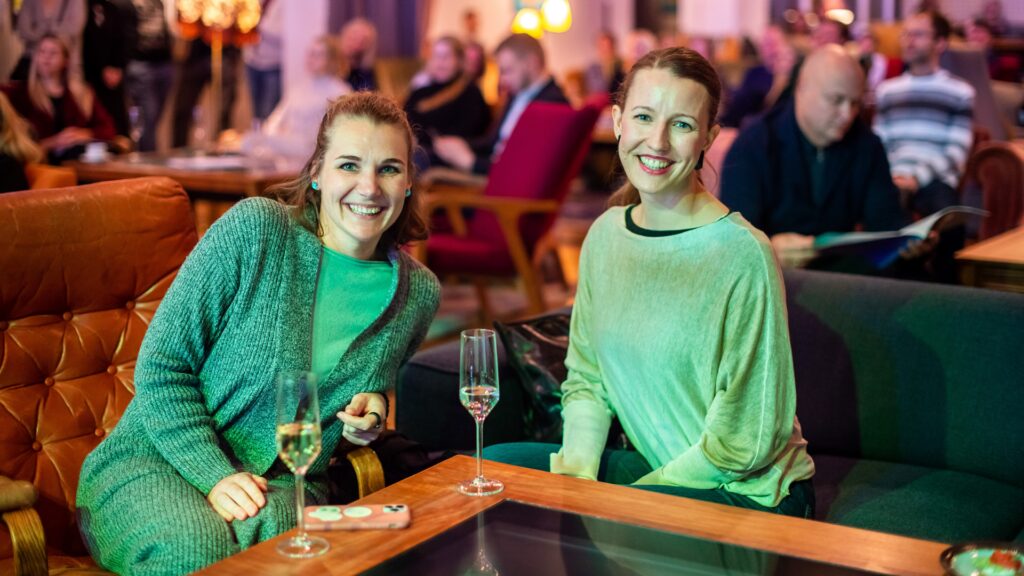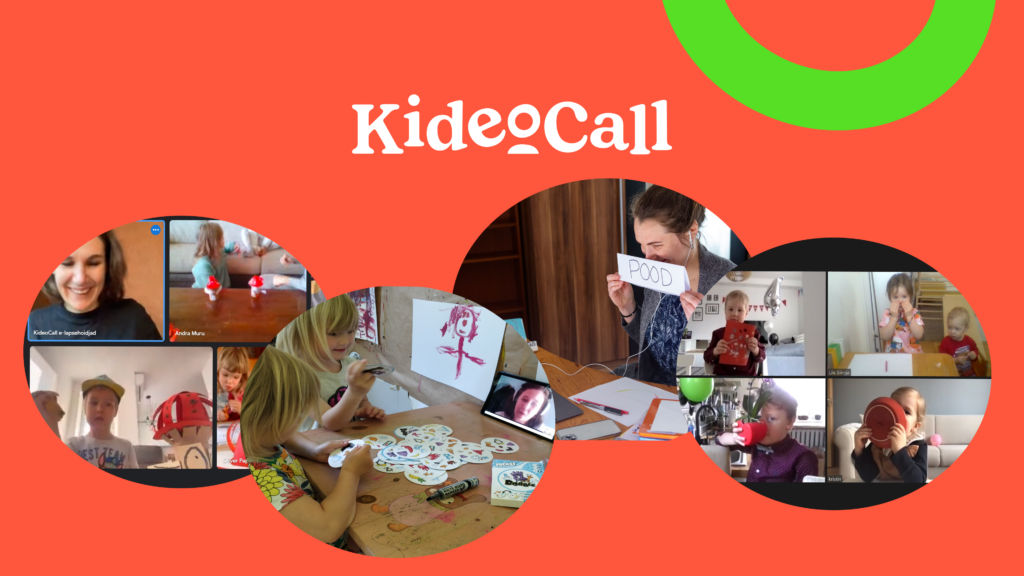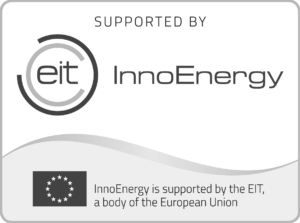13.07.2023
Education startup KideoCall has launched a new virtual language learning solution

We normally write about the companies in Tehnopol Startup Incubator growth programme in our Startup Story series, but we are using a different format for KideoCall. The simple reason for this is that they are attending our growth programme for the second time, and as this is the first time anyone has done that in the history of the incubator, we decided to write separately about them and at greater length.
Co-founder of KideoCall Liis Siiroja has a strong background in communications, but has always been attracted by education. She has worked with children as a camp leader and an assistant in kindergarten, and has given lessons as a substitute teacher. Liis is a member of the Estonian Montessori Association and said that this form of teaching is what interests her most, and that KideoCall has taken its approach from there.
The other co-founder of KideoCall is another Liis, Liis Vääna, and she has a background in education. She has been working in education for more than a decade, having worked in kindergartens and schools and with children with special needs. She is responsible for the whole methodology behind KideoCall.
The two women together created a company that started by offering online childcare services, but has now moved its main focus onto online language learning for children. We asked Liis Siiroja about the history of the company and its future plans.
First of all, how did KideoCall first get started?
We started by offering an on-demand online childcare service during the Covid-19 pandemic. Parents of small children already knew what a challenge it is to work at home when looking after a sick child, but this became an even greater worry during the pandemic, and increased the demand for new solutions.
What does KideoCall do today, and how different is it from what you started out with?
At first, we were offering help to families where pre-school children had to be at home for various reasons while their parents still had to do some work in their home office. To cut the time that those small children spent staring passively at a screen and reduce the stress they felt from a lack of attention, we provided online play-dates through an online childcare service. This meant the child had one or two hours of activities through a video call, allowing the parents to use that time to focus on their work or other tasks.
But we got more and more contacts from families who had moved out of Estonia, or who had moved to Estonia from abroad. These families wanted language sessions for their children alongside the other activities so that their children would develop their language through activities that they could enjoy. To manage this, we had to change the content of our services. We now help the pre-school children of families who have moved to foreign countries to maintain and develop their mother language, and to learn the local language if needed.
Our main target group is children aged 3-8, but there are also some older children. We offer both one-to-one language classes and, increasingly, language groups. These follow the format of any children’s activity club, where we meet once or twice a week, and the children are in a regular group with a fixed coach. We have worked with Tallinn University to put together the programme for our language groups.
How many coaches do you have, and how did you find them?
We now have 10 teachers and youth workers working with the children. Our other co-founder, Liis Vääna, is responsible for training the coaches. Additionally, we offer an online childcare course at Tartu Health Care College. This training program can be adapted for other languages and institutions in the future.
Our coaches are highly skilled and have all the tools that they need to involve even small children aged around three through a video call. We have seen how a coach who has information in advance on the interests of a new child and their favourite things can set up really good, and warm relations with that child within five minutes. Then 98% of those children are communicative and engaged throughout the whole session.

Do you have any competitors in the Estonian market or in neighbouring countries? How are you different to them?
In online childcare or babysitting, we had mainly competitors in the US market. These services are aimed at slightly older children, the sessions are shorter, and they have usually a fixed programme for all kids. We are different because we focus on the interests of the child, which means we can be more flexible in our activities and keep the child engaged for a longer time. Our one-hour language groups work well even for three-year-olds so that their parents do not need to be involved, and we have not seen our competitors being able to hold the interest of such small children for so long.
There are as well other services that offer language classes over video calls, but they are aimed more at schoolchildren and are generally for learning foreign languages. We are different because we use play-based learning, and we focus mostly on the needs of expat families who want to support their children’s native language.
You are now taking part in the Tehnopol Startup incubator growth programme for the second time. Why did you want to apply for second time?
The first time around we came to the Startup Incubator with our original virtual babysitting service, which was called E-lapsehoidja. At that point we were offering B2B solutions and targeting our services at businesses, who could then provide that service to their staff and so help them when they were working from home.
We came to the incubator for the second time after the content of our service changed and our name changed from E-lapsehoidja to KideoCall. We were particularly interested when the Startup Incubator opened a batch for impact companies that provide additional value as a social enterprise. The content of the impact company batch matched the goals of our mission, and the timing worked well. We also liked being able to go through the batch with other impact companies and to get feedback on that from mentors and investors.
The greatest value of the incubator for us was our key mentor Raido Pikkar. He has been with us from the first incubator and has gone deeply into our ideas and challenges, and helped us set our strategies. Above all he teaches us how to ask the right questions so we can take well-informed decisions. We have also had great support from our other mentors Aleksander Gansen and Ede Schank Tamkivi.
What are your plans at KideoCall for the summer? Do you have anything new planned?
Yes, we are setting up a new concept of virtual language camps, where we bring together children from around the world to practice languages by playing together, and doing it for a week at a time. Each camp lasts for five days and the children meet for 60 minutes a day for fun and games, creative activities and word games. It is different from the regular groups because it is held for five days in a row, and the children can practice and develop their language while also speaking with new friends in that language. This is often a concern for families, as when they move abroad there are not always other children around who speak the same language at home.
How much interest has there been so far in the language camps?
Interest is growing, and it is quite a challenge for us to fit together children of similar ages, language levels and time zones, as we have had bookings from places as far apart as Sweden, New Zealand and Brazil. But the current level of interest shows that parents are making an effort to find additional ways of supporting the language development of their children, and they often feel quite alone with that concern.
What are your plans for the future? Are you planning to enter any foreign markets?
Our service is based on language, and so we are moving forward and developing our services through language and not by region. We are currently mapping out the different languages that we could offer our services in next. We are aware of which language groups have seen a lot of parents move abroad, and we are also looking at the feedback that we get from our current clients, who are people of other nationalities that have moved to Estonia. This gives a better picture of which languages and cultures are more receptive to virtual services like ours. Estonian-speaking families also give us feedback on the current situation in the countries where they live, and how much interest there is in our services among the expat communities there.
We will also be looking to hire in the near future, as we are particularly looking for a marketing manager who could help bring the KideoCall services to more families.
Going back the history of the company, if you were to start again today in the startup sector, would you do it?
I cannot answer in a general sense about whether I would build something new in the startup sector or not, as the question for me is what the particular need is that I have noticed, what the solution is that I am interested in, and what my internal motivation is for launching that solution. If I see that need and I believe in my solution, then of course I would take my next idea to the startup sector. I just felt at one point that I could not walk past and not tackle this problem, and that became my main source of motivation. This is a lasting source of motivation that helps you to work for longer on the problem that needs to be solved.
What would you recommend to anybody who is right now thinking of beginning a startup?
Above all find somebody who is equally interested in the problem and the solution, and who can give you support. Secondly go and speak to the people who are actually affected by the problem, or who you believe are affected. And thirdly, find a mentor who will not just give you immediate answers, but will teach you how to find them for yourself.
For more on the KideoCall summer camps see: https://kideocall.com/virtual-estonian-language-camps/
If you are interested in working with the company and you are excited about everything to do with marketing, then write to liis.siiroja@kideocall.com.
Try the KideoCall services and give them feedback! Use the code #edtechx to try all the services at a discount rate until 31 July. See more at: https://kideocall.com/en/edtechx/












